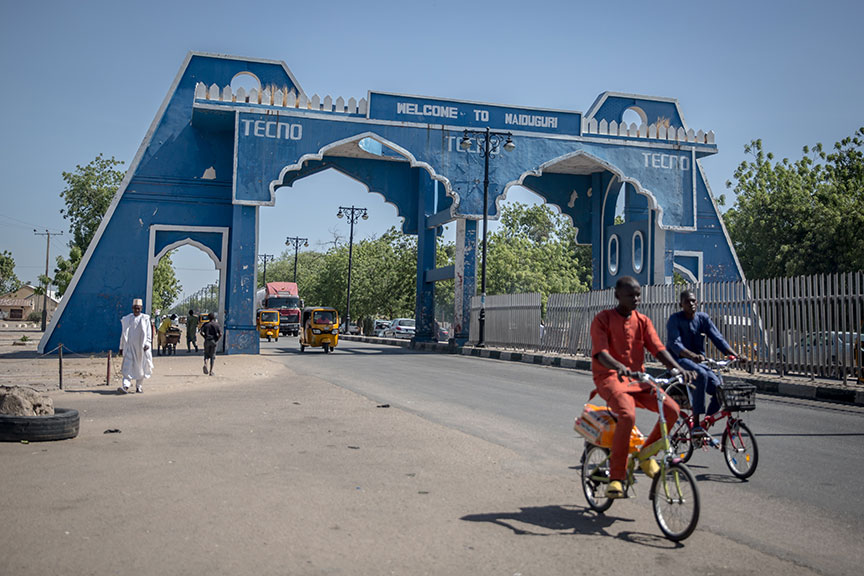A terrorist group that dominates the Lake Chad region collects about $191 million annually in taxes it imposes on farmers, livestock owners and fishermen, according to a new report by an independent nonprofit news organization.
The New Humanitarian report compares the collections by the Islamic State West Africa Province (ISWAP) with those of the Borno State government in Nigeria’s northeast, where the terrorists operate. The study says Borno State collected $18.4 million in 2024, less than a 10th of ISWAP’s proceeds.
The reported $191 million does not include revenue from other areas in Nigeria, earnings from kidnapping, or reward payments the Islamic State group makes for equipment ISWAP captures from the Nigerian military.
ISWAP controls many of the hundreds of islands in the Lake Chad region. The islands serve as a rear base, logistics hub and staging ground for the group’s attacks, according to the news agency HumAngle. The group controls parts of Burkina Faso, Cameroon, Chad, Mali, Niger and northern Nigeria.
Malik Samuel, a senior researcher at Good Governance Africa, wrote the July 2025 report after interviewing farmers, fishermen, former ISWAP clerics and officials. He noted that at least 10,000 large-scale fishers access ISWAP territory each year. He said the terrorist group attempts to present itself as a viable alternative to the Nigerian government.
The Lake Chad region has a wealth of natural resources for fishing, farming and raising cattle. Because Lake Chad is at the junction of four countries — Cameroon, Chad, Niger and Nigeria — it creates trade opportunities for “contraband that profits from differences in tax levels,” HumAngle reported.
According to the Institute for Security Studies, the reasons for ISWAP’s increased extortion in the region include financing its expansion in Nigeria, dealing with the effects of military operations on its finances and reducing the impact of a slumping currency.
The terrorist group began in March 2015 in northern Nigeria, when Boko Haram leader Abubakar Shekau pledged allegiance to IS, forming ISWAP as the official Lake Chad regional affiliate. Eventually, ISWAP parted ways with Shekau over his indiscriminate violence and suicide bombings. In 2021, the group defeated Shekau’s Boko Haram faction. By the early 2020s, the group had overrun Nigerian and regional military outposts and since has absorbed some Boko Haram fighters. It continues to oppose some Boko Haram remnants and splinter groups. Today, it is one of IS’s most important strongholds outside the Middle East. Shekau killed himself in May 2021 during a battle with ISWAP.
The group came to be better organized and more powerful than Boko Haram by focusing on local support through selective violence and by providing basic services. Paying for those services, and the goodwill they generate, was the basis for the group’s taxation methods.
But ISWAP taxation is not a formal arrangement. There are no true fixed rates or written standards, so the taxes imposed are left to the discretion of leaders, “creating opportunities for abuse and corruption,” Samuel wrote. Although some services are provided, civilians have no say in how they are governed. Those who dare to question the group risk severe punishment, including imprisonment and death. The semblance of order and protection often masks systemic oppression.
“By carrying out governance activities, ISWAP demonstrates how jihadist organisations attempt to legitimise themselves before the people, making it easier to recruit and generate revenue, while simultaneously making it harder for the government to uproot them,” Samuel wrote.
His study notes that many of ISWAP’s services are free, including water supplies, boats and canoes for transportation, and some health care. But the group’s system of taxation is neither optional nor fair.
Kaka Ali, a farmer in northeast Nigeria, told the Pulitzer Center that to resist the taxation means to lose everything, and perhaps even get a beating in the process. If a fisherman enters ISWAP waters without proof of having paid the group’s taxes, it can mean death by flogging. If a fish dealer refuses to pay his taxes, “he loses his entire shipment, life, or even risks abduction,” the Pulitzer Center reported. Herders pay a cattle tax that can be completely arbitrary. Cattle herders can end up paying double what they expected, wiping them out financially. The group has attacked entire communities, murdering dozens of people, for failing to pay.
“We cannot defend ourselves against them,” Kaka told the Pulitzer Center. “We used to defend ourselves against herders and thieves. But with the terrorists, there is no such option. We give them what they want.”

